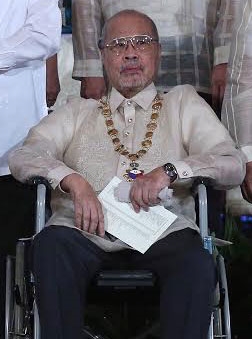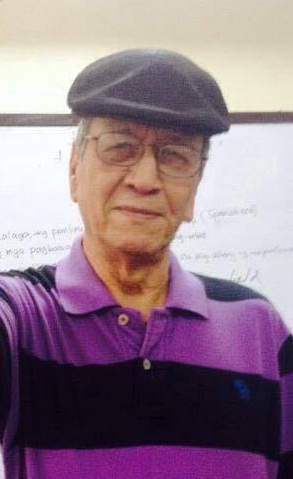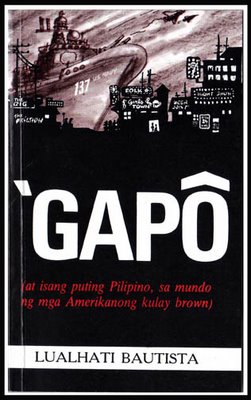Related Research Articles
Philippine literature is literature associated with the Philippines from prehistory, through its colonial legacies, and on to the present.

Francisco Balagtas y de la Cruz, commonly known as Francisco Balagtas and also as Francisco Baltasar, was a Filipino poet and litterateur of the Tagalog language during the Spanish rule of the Philippines. He is widely considered one of the greatest Filipino literary laureates for his impact on Filipino literature. The famous epic Florante at Laura is regarded as his defining work.

Florante at Laura is an 1838 awit written by Tagalog poet Francisco Balagtas. The story is loosely based on his own biography: Balagtas wrote the epic during his imprisonment in Manila in c. 1835 – c. 1836. The story was dedicated to his former sweetheart María Asuncion Rivera, whom he nicknamed "M.A.R." and Selya in Kay Selya.
Francisco "Franz" Arcellana was a Filipino writer, poet, essayist, critic, journalist and teacher.

Amado Vera Hernandez, was a Filipino writer and labor leader who was known for his criticism of social injustices in the Philippines and was later imprisoned for his involvement in the communist movement. He was the central figure in a landmark legal case that took 13 years to settle.
José de la Cruz, more popularly known as Huseng Sisiw, was one of the great Tagalog writers during the Spanish colonization of the Philippines.
Liwayway A. Arceo was a multi-awarded Filipina fictionist, journalist, radio scriptwriter and editor from the Philippines.
The 25th Don Carlos Palanca Memorial Awards for Literature was held to commemorate the memory of Don Carlos Palanca Sr. through an endeavor that would promote education and culture in the country.
The 34th Don Carlos Palanca Memorial Awards for Literature was held to commemorate the memory of Don Carlos Palanca Sr. through an endeavor that would promote education and culture in the country. This year saw the category of Novel/Nobela, for both the English and Filipino Divisions, being open for competition only every two years.
The 33rd Don Carlos Palanca Memorial Awards for Literature was held to commemorate the memory of Don Carlos Palanca Sr. through an endeavor that would promote education and culture in the country.
The 39th Don Carlos Palanca Memorial Awards for Literature was held to commemorate the memory of Don Carlos Palanca Sr. through an endeavor that would promote education and culture in the country. This year saw the inclusion of a new category, Short Story for Children/Maikling Kwentong Pambata, for both the English and Filipino Divisions.

Cirilo F. Bautista was a Filipino poet, critic and writer of nonfiction. A National Artist of the Philippines award was conferred on him in 2014.

Dekada '70 is a Filipino novel by Lualhati Bautista. It tells the story of a middle-class family in Manila living through martial law under Ferdinand Marcos. The novel was awarded the 1983 Palanca Award Grand Prize.

Rogelio Lunasco Ordoñez also known as Ka Roger, was a multi-awarded Filipino fiction writer, poet, activist, journalist and educator. He was one of the authors of the iconic Tagalog literature anthology Mga Agos sa Disyerto in the 1960s. He was a contributor to Liwayway Magazine, Pilipino Free Press, Asia-Philippines Leader, Pilosopong Tasyo, Diario Uno and Pinoy Weekly.

The mayor of Valenzuela, a highly urbanized city in northern Metro Manila, Philippines, is the official head and chief executive of Valenzuela. He leads on enforcing city ordinances and improving public services. The mayor has a term of office of three years, but has a maximum electoral tenure of three consecutive terms. Inaugural holder of the office was Pío Valenzuela (1869–1956), served from 1899 to 1901, whom the city received its name.
Alejandro G. Abadilla, commonly known as AGA, was a Filipino poet, essayist, and fiction writer. Critic Pedro Ricarte referred to Abadilla as the father of modern Philippine poetry, and was known for challenging established forms and literature's "excessive romanticism and emphasis on rhyme and meter". Abadilla helped found the Kapisanang Panitikan in 1935 and edited a magazine called Panitikan. His Ako ang Daigdig collection of poems is one of his better-known works.
"Sa Aking Mga Kabatà" is a poem about the love of one's native language written in Tagalog. It is widely attributed to the Filipino national hero José Rizal, who supposedly wrote it in 1868 at the age of eight. There is no enough evidence, however, to support authorship by Rizal and several historians now believe it to be a hoax.

'GAPÔ is a 1988 Tagalog novel written by award-winning Filipino author Lualhati Bautista. Its complete title is 'GAPÔ at isang puting Pilipino, sa mundo ng mga Amerikanong kulay brown which means "'Gapô and one white Filipino, in a world of brown Americans" in translation. 'Gapô is an abbreviated form of the Philippine place name Olongapo.

Hermenegildo Cruz (1880–1943) was a Filipino writer and prominent trade union organizer. He was a founding member of various trade union organizations in the Philippines, notably of Unión Obrera Democrática Filipina, and was a member of the Philippine Assembly. He became assistant director of the Bureau of Labor from 1918 to 1922 and eventually its director from 1922 to 1935.
References
- ↑ Maître Tace, ISBN 978-1-326-57955-5